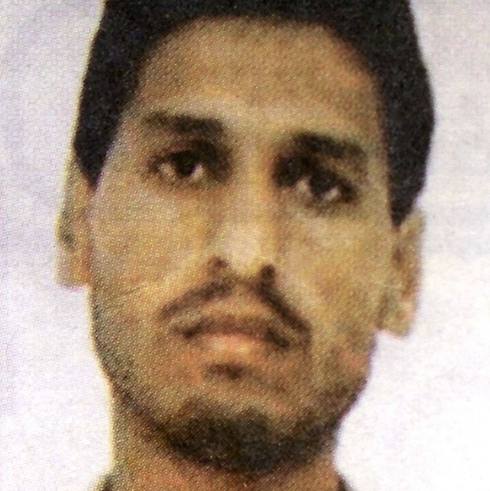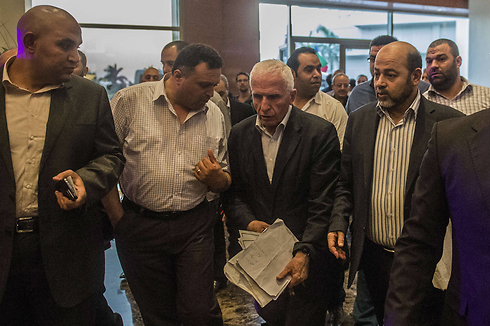
Israel must make a decision on Gaza
There is a range of options for Israel to end the conflict in Gaza, and the government now needs to examine the alternatives, and make a decision.
Time and time again Israel has been given proof that Hamas is an enemy that does not give up easily. Like other armed groups within fanatical, militant Islam, a lot of patience and repeated, ongoing blows to its weak spots are required to quiet such a group.
In 2004, during the Second Intifada, Israel had to eliminate Sheikh Ahmed Yassin, Hamas' religious, ideological founder and leader, as well as political chief Abdel Aziz al-Rantisi, in order to end to the group's suicide bombings.
Now, during Protective Edge, something is needed that will have a similar impact, something that will knock Hamas off balance - or Khaled Mashal and his Qatari puppet-master will only keep up with their unreasonable demands.
For these demands have just one objective – obtaining some kind of achievement to justify the fact that organization dragged the Gazans into this terrible never-ending situation.
It is still unclear if Mohammad Deif was killed in the bombing of a Gaza City home on Tuesday night, but if the man hit along with Deif's wife and son was indeed the head of the Hamas military wing, this will probably shorten the current campaign. For now, Hamas is maintaining its ambiguity, which increases the likelihood that Deif was wounded or killed.
There have been cases in which the assassination of a leader of a terrorist organization resulted in the group's breakup, and an end to its activities, and there were instances in which it had no effect at all. One example in which it mattered not one jot was the killing of Ahmed Jabari, the former head of Hamas' military wing, at the start of Operation Pillar of Defense in 2012. It remains to be seen if Israel has indeed managed to kill Deif – and how this would affect the political and military branches of Hamas.
In this context, it is fair to ask why the IDF did not try to hit Deif earlier in the current operation. The answer can probably be found in the phrase "operational opportunity". Hamas leaders were deep inside their tunnels and hidden bunkers long before the fighting began. Perhaps Mohammed Deif made a mistake and left his hiding place prematurely.
Options on the table
Israel must now plot a new route. The minimum objectives are years-long stable calm, and preventing Hamas and other Palestinian factions in the Gaza Strip from rearming. Israel should strive to achieve demilitarization, but it seems that this issue will have to be postponed to a future stage, in which a long-term agreement is reached with the involvement of Egypt, the Palestinian Authority, the moderate Arab states, the European Union and the United States.
The minimum goals can be achieved in two ways – via diplomatic channels and/or through military action that would include a ground incursion into Gaza.
Diplomatic channels:
* Bilateral agreements between Israel and Egypt, and between Israel and the Palestinian Authority led by Mahmoud Abbas, which Hamas would accept as a given and declare calm.
The incentive for Hamas to accept this series is the opening of the Rafah crossing between Gaza and Egypt, and a joint promise from Abbas and Egypt that Israel would ease pressure on the group.
Hamas would also have to swallow Palestinian and international inspection of the goods entering Gaza, aimed at preventing a new military buildup. It would not be simple, but nonetheless easier for Hamas to agree to such supervision as part of an Egyptian and Palestinian initiative, and not as a concession to Israel, especially as in return it gets funds to pay the salaries of its civil servants. Until an agreement is reached and until Hamas agrees to a truce and international inspection of materials entering the Gaza Strip, the IDF will continue to pound it from the air.
* A joint Israeli, Egyptian, and American appeal to the UN Security Council for a resolution that provides a diplomatic umbrella for a long-term agreement on Gaza.
As was the case at the end of the Second Lebanon War, an international umbrella would give Hamas cover to climb down from its tree and agree to concessions that it would not be willing to accept directly opposite Israel and Egypt. This is the most realistic option under the current circumstances, provided the Egyptians agree to give up the exalted position they now hold as mediator.
The military operation
This could be conducted in parallel to one of the diplomatic channels listed above - or separately, before continuing diplomatic efforts.
Pounding Hamas from the air is, in the current circumstances, not enough. A ground operation will be required to make Hamas ask for a ceasefire. Here, too, there are several options.
One of them - the most extreme - is the reoccupation of the Gaza Strip by Israel in order to topple the Hamas regime. In this scenario, the IDF would have to remain in Gaza for at least a year, and then hope that an effective solution could be found, perhaps in the form of Mahmoud Abbas, who would take the control over the 1.8 million Gazans off our hands. Another possibility is that although a ground operation would be limited in scope, Hamas would end up facing a serious threat to its survival and to its military wing.
The IDF has plans for several operations that could be conducted in parallel or in a staggered fashion – although it is probably not wise to elaborate further. It is enough to know that the IDF has the option of ending the fighting through a combined ground-air-sea campaign. However, the price in terms of casualties would be high, and it would take about two weeks to bring about a conclusion that is deemed successful from an Israeli perspective.
The Cabinet will have to examine the alternatives – and even perhaps a combination between them - and make a decision.












